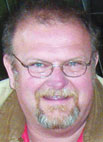
Dairyman Duane Kaiser is hopeful about the future of agriculture, including dairy farming. He insists one of the great things about capitalism we need to remember is “what creates hardship for one, means opportunity for someone else.” Duane believes the time is fast approaching when a person could buy a dairy farm.
Larry Moennig, from First State Bank of Purdy, Mo., is also optimistic. He spoke at the Monett Dairy Day and said that banks have money to loan and have found out that agriculture loans are very stable. He said, “We’re eager to make good loans to good customers.” It could take a little more paperwork and planning, but a person needing a loan right now is encourage to apply.
What the low milk prices mean for Duane, for now, is he won’t be selling his bred heifers as he has in the past. He’ll just be milking closer to 80 than 60. “We’ll get through this,” Duane said, “we always do.”
Duane has taught high school agriculture for 29 years, the last 26 at East Newton High School. The kids he works with are one reason for his optimism. "Kids haven’t changed, they’re good kids,” he said, “they may have to work a little harder.” Back to the way our country works, there are rewards for those willing to work.
In 2003, Duane was awarded “Outstanding Teacher of the Year.” The reason he started and continues to teach is to give back to the profession that helped him so much. His Ag teachers in high school cared about and believed in him. He wants to give that to other kids.
The Barry County farm where Duane has milked since he was a child has had Guernsey cows milked there since the 1880’s when his grandfather settled there with other German Lutherans. “It’s traditional,” said Duane of the farm and his management style. He has different forage available but doesn’t do intensively managed grazing yet. He said he probably will once he retires from teaching and has more time. “But,” he added, “I’ve got at least five years of work to do around here just fixing fence and getting caught up.”
Red River Crab Grass is one of Duane’s favorite forages. It is high yielding and doesn’t need as much nitrogen as orchard grass. He believes we should concentrate on getting more native grasses, as opposed to importing. His wife, Colleen, son, James and daughter, Stephanie help with the farm. They’re all involved with showing cattle. He usually has someone milk in the evenings for him.
In addition to the original Guernsey herd, Duane began adding registered Jersey in 1980. He worked with a recovery program to get the Guernsey herd registered. Both breeds can stand the heat better than Holstein and they don’t need as much high-quality forage. For Duane it has “Never been about production. It’s not how much milk you sell, it’s how much money you make from the milk you sell.”
Five years ago he began selling his milk to Central Equity because they pay premiums on the milk components. Guernsey and Jersey milk is high in butterfat, protein and other solids. He figures he has made an extra $7,500 per year since Central Equity started buying his milk.
When asked for advice Duane quotes one of his college teachers, J.N. Smith, a then-SMS Professor of Economics and Farm Management. “New is nice, but paid for is better. You either work for yourself or you work for the bank. Always do the math.” Duane smiled, “I always remembered that and about five years later I understood it.”







